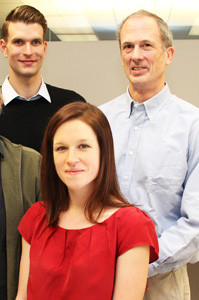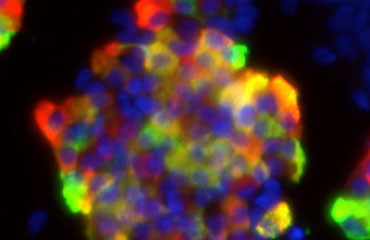R.I. biotech firm, CytoSolv, acquired by Semma Therapeutics
Encapsulated cell technology pioneered by Rhode Island firm to play critical role in efforts to develop artificial pancreas to treat patients with diabetes
PROVIDENCE – The evolution of the biomedical innovation ecosystem in Rhode Island continues apace, with an emerging company being acquired for its world-class encapsulated cell technology
On Monday, Nov. 16, CytoSolv, Inc., announced that it been acquired by Semma Therapeutics of Cambridge, Mass.
CytoSolv, founded in 2009, will continue to operate out of its recently expanded facilities at 117 Chapman St. in Providence. The firm’s executive team, now employees of Semma Therapeutics, will play key roles at the Cambridge-based firm. The firm currently has eight employees and expects that it will be hiring new employees.
Founded in 2015, Semma Therapeutics holds the exclusive license for the translational technology developed by the pioneering research work in the Harvard University lab led by Douglas A. Melton, Ph.D.
Semma Therapeuics is seeking to use its breakthrough stem cell technology to develop an artificial pancreas that will allow treatment of diabetes without the need for daily injections of insulin or monitoring of blood sugar.
More specifically, the Melton lab discovery provides a method for transforming human stem cells into functional, insulin-producing beta cells to replace the beta cells of the pancreas that are lost in type 1 diabetes.
Semma Therapeutics recently announced that it raised $44 million in venture funding, including Series A financing led by MPM Capital, with participation from F-Prime Capital Partners [formerly Fidelity Biosciences] and Arch Venture Partners. Other investors in Semma Therapeutics include corporate partners Novartis and Medtronic, both companies with major strategic interests in therapies for diabetes.
The acquisition of CytoSolv speaks to the critical contribution that its cell encapsulation technology is expected to play in transplanting these new beta cells into patients, without the need for drugs that suppress the immune system, according to the news release issued by the Slater Technology Fund, one of the initial investors in CytoSolv.
The acquisition also underscores the legacy of Rhode Island’s pioneering research scientists in the biotech world, dating back to 1988, with the founding of Cellular Transplants, Inc., a genesis that helped to spawn new biotech firms such as CytoTherapeutics, Neurotech, LCT BioPharma, and NsGene, along with CytoSolv.
“CytoSolv is a particularly compelling example of how scientists in Rhode Island’s life science research enterprise are capable of commanding a role on a world-class stage,” said Richard G. Horan, senior managing director of the Slater Technology Fund, which had invested some $500,000 in CytoSolv to help launch the company. “In this case, the scientific legacy goes back to the earliest days of biotech in Rhode Island, to distinguished researchers such as Pierre Galletti and Patrick Aebischer and Michael Lysaght, all of whom played pioneering roles in the development of the enabling technology. We are thrilled to be part of this exciting endeavor.”
In turn, Dr. Moses Goddard, one of the co-founders of CytoSolv, had praised the role that Slater played in the helping the startup firm get up and running.
“CytoSolv is unusual among biotech startups in that the invention that the company is based on was conceived or developed in a university setting or in an already established company,” Goddard told Ted Nesi in an interview for the Providence Business News in June of 2010. As a result, Goddard continued, it would have been very difficult for CytoSolv to secure grant funding from the National Institutes of Health or from venture capital firms, because it was too “virtual” to be credible, no matter what the preliminary data showed.
“The Slater loan has allowed us to rent lab space, support employees, strengthen the experimental data for our drug, and work on our manufacturing process – all of which will make us much more likely to succeed in our next round of funding efforts,” Goddard said in the 2010 interview.
Encapsulating the history
The development of CytoSolv’s encapsulating cell technology had its roots in the research work of Galletti, Aebischer and Lysaght, which led in 1988 to founding of the company first known as Cellular Transplants, Inc., that later became CytoTherapeutics.
CytoSolv had been founded in 2009 by Goddard, Christopher Thanos and John Mills, with an initial focus on developing a therapy for wound-healing in diabetic foot ulcers.
The encapsulating cell technology was further developed in collaboration with Living Cell Technologies, Ltd., a publicly traded company with operations in Australia and New Zealand.
As described in the news release, Living Cell Technologies was a “pioneer in the development of porcine-based islet transplants for diabetes that relied upon cell encapsulation technology developed in collaboration with CytoSolv founders.”
Goddard, in his 2010 interview with Nesi, explained that Living Cell Technologies was a company that was trying to develop a drug to treat diabetes – “based on taking insulin-producing cells from pigs, enclosing the cells in a capsule that prevents immune rejection, and then implanting the encapsulated cells in the abdominal cavity of the diabetic patients” – a technology that Goddard said was very similar to what was developed by CytoTherapeutics.
In 2014, CytoSolv decided to move away from diabetes wound therapy and reposition itself to focus on cell encapsulation, a technology in which the firm’s founders had substantial background and experience.
The acquisition by Semma Therapeutics makes that look like a very prescient decision.
What the acquisition means
Dr. Moses Goddard, a co-founder of CytoSolv, is now serving as chief medical officer at Semma.
Christopher Thanos, Ph.D., also a co-founder of CytoSolv, has been named vice-president of Delivery at Semma.
Briannan Bintz, a principal scientist at CytoSolv since it was founded, will now serve as director of Delivery at Semma.
In turn, Semma will also continued the collaboration that CytoSolv has had with Kineteks LLC, based in Warwick, and with John Mills, Kineteks’ principal scientist and technologist. [Mills had also been a co-founder of CytoSolv.]
ConvergenceRI spoke with Goddard recently, to help provide a proper framework to view the acquisition of CytoSolv by Semma Therapeutics:
Goddard began by praising his colleague Christopher Thanos, whom he called a “gem” within Rhode Island’s biomedical innovation ecosystem.
“Chris is an extremely innovative, extremely rigorous young scientist,” Goddard told ConvergenceRI. “He comes from Seatttle, but he’s home-grown in terms of training – undergraduate at Brown, graduate work at Brown, all his biotech work in Rhode Island.”
Thanos is an example, Goddard continued, “of us growing our own extremely competent scientists, who can play in the Kendall Square/Harvard environment.”
Rhode Island, Goddard said, is both “blessed and cursed” to be located so close to the world juggernaut in biotech that is Boston and Cambridge. “We have to focus our attention on how to use that to our advantage,” he said. “If we act defensively or competitively, it’s unlikely to go our way.”
The acquisition, Goddard continued, is very much a net positive, and the company, now part of Semma Therapeutics, is going to remain in Rhode Island for the immediate future.
Goddard traced the research back to Pierre Galetti, with whom he worked in the 1970s. “Pierre Galletti was my boss, I respected him like my father,” Goddard explained. Galletti, who had been one of the driving forces in establishing the Warren Alpert Medical School at Brown, died tragically in 1997 following a fall.
Although the initial company, CytoTherapeutics, did not turn out to have been successful, Goddard continued, “It trained a [scientific workforce] workforce within the state of Rhode Islnd. I am one of the people who cut my teeth and was trained at CytoTherapeutics.”
The experience, Goddard said, showed how to “transition [lab] bench work at Brown University and imagine it becoming a product. It’s a local Rhode Island research legacy, pushing 30 years.”
For Slater’s Horan, the acquisition of CytoSolv by Semma Therapeutics has combined a team of proven innovators in encapsulated cell technology with the leading player in stem cell-based therapy for diabetes. “Collaboration by way of merger is an increasingly common way of assembling the capabilities needed to address such major unmet needs in clinical medicine," Horan said. “Doing so with a partner that is able to marshall the resources, such as Semma has succeeded in doing, is a particularly attractive option."







